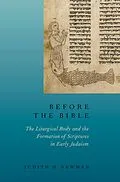Before the Bible reveals the landscape of scripture in an era prior to the crystallization of the rabbinic Bible and the canonization of the Christian Bible. Most accounts of the formation of the Hebrew Bible trace the origins of scripture through source critical excavation of the archaeological "tel" of the Bible or the analysis of the scribal hand on manuscripts in text-critical work, but the discoveries in the Dead Sea Scrolls have transformed our understanding of scripture formation. Judith Newman focuses not on the putative origins and closure of the Bible, but on the reasons why scriptures remained open, with pluriform growth in the Hellenistic-Roman period. Drawing on new methods from cognitive neuroscience and the social sciences as well as traditional philological and literary analysis, Before the Bible argues that the key to understanding the formation of scripture is the widespread practice of individual and communal prayer in early Judaism. The figure of the teacher as a learned and pious sage capable of interpreting and embodying the tradition is central to understanding this revelatory phenomenon. The book considers the entwinement of prayer and scriptural formation in five books reflecting the diversity of early Judaism: Ben Sira, Daniel, Jeremiah/Baruch, Second Corinthians, and the Qumran Hodayot (Thanksgiving Hymns). While not a complete taxonomy of scripture formation, the book illuminates performative dynamics that have been largely ignored as well as the generative role of interpretive tradition in accounts of how the Bible came to be.
Autorentext
Judith H. Newman is Associate Professor of Hebrew Bible and Early Judaism in the Department for the Study of Religion and Emmanuel College in the University of Toronto. Trained at Yale Divinity School (MAR) and Harvard (PhD), her current research interests are in the ritual performance of texts particularly as this intersects with the formation of communities in early Judaism and Christianity. Emerging projects include a commentary on the book of Judith and its reception through the ages; and a study that reconceives early Jewish temporalities.
Inhalt
Introduction 1. Before the Bible: Understanding Text in Light of the Dead Sea Scrolls 2. The Liturgical Body and the Ubiquity of Prayer 3. The Formation of Scriptures and Discerning Revelation 4. From Literary Text to Scripture Chapter 1 Shaping the Scribal Self through Prayer and Paideia: the Example of Sirach 1.1. Prayer and the Formation of the Scribe 1.2. The Self through Neurological Lenses 1.3. The Self as a Cultural Achievement 1.4. Becoming Sirach: Understanding the Fluid Manuscripts Chapter 2 Confessing in Exile: The Reception and Composition of Jeremiah in (Daniel) and Baruch 2.1 Daniel and Baruch within the Contours and Practice of Confessional Prayer 2.2 Daniel, Jeremiah, and the Angelic Oracle 2.3 Confessing with Baruch in Babylon and Jerusalem Conclusion Chapter 3 The Eucharistic Body of Paul and the Ritualization of 2 Corinthians 3.1. The Collection for Jerusalem and Group Cohesion 3.2. Blessing as a Source of Consolation and Apostolic Authority 3.3. Ritualizing the Letter through Performance Conclusion Chapter 4 The Hodayot and the Formation of a Textual Community in The Yahad 4.1 Reading, Studying, and Blessing in a Textual Community 4.2 The Hodayot and the Formation of Communal Identity 4.3 The Maskil's Embodied Performance of Confession 4.4 The Ritualization of the Hodayot Conclusion Conclusions Bibliography
